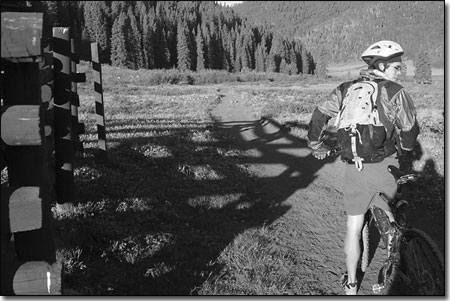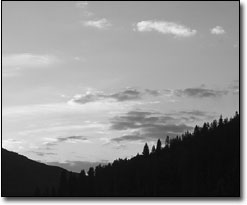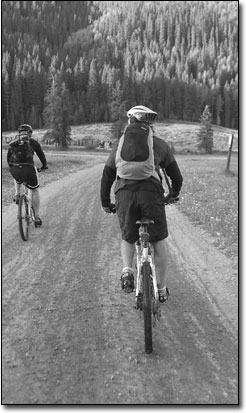|
Durango-to-Moab mountain bike hut system approved
by Wil Sands
 |
| LA rider pauses in the early
morning sun at the Hermosa Creek trailhead last weekend.
Mountain bikers riding the first leg of the recently
approved Durango to Moab Hut System will pass near this point./Photo
by Todd Newcomer. |
A mountain bike hut system connecting Durango and Moab officially
opened for business this week. After 16 months of tense negotiations
and differing expectations, the San Juan National Forest has
granted San Juan Hut Systems a permit for the route. The hut
system's first customer left Durango Mountain Resort on Tuesday
and should arrive in Moab on Monday, June 21.
Joe Ryan, owner-operator of San Juan Hut Systems, said he appreciated
last week's Forest Service decision. Currently, he is working
to assemble the route in quick time and is hauling or putting
the finishing touches on the six temporary huts that comprise
the route.
"It's good and we're glad," he said Monday. "We've got our first
client coming in tomorrow. We're also scrambling to get everything
ready. We're hauling the first hut up to Bolam Pass ahead of
the client."
 |
The sun rises over the Hermosa Creek drainage
on
the backside of Durango Mountain Resort./Photo by
Todd Newcomer. |
Ryan's company has operated a popular hut-to-hut system between
Telluride and Moab for years and has said that there is huge
demand for a new route. Consequently, in February of last year,
he approached the local Forest Service with plans for a mountain
bike route between Durango and Moab linked by backcountry huts.
Now it is a reality.
The system begins near Durango Mountain Resort and crosses Bolam
Pass into the Dolores drainage south of Lizard Head Pass. From
there, the route climbs behind the Wilsons, then descends into
Paradox Valley and skirts the La Sal Mountains before dropping
into Moab. Compared to the San Juan Hut Systems' existing route,
Ryan characterized Durango to Moab as more remote and more visually
stunning. He also said that while the riding is technically easy,
the link-up would be more physically demanding than its Telluride
to Moab brother.
"The route is phenomenal, and it's difficult," Ryan said. "It'll
challenge riders physically, and it'll challenge their route-finding
abilities."
This 215-mile ride follows existing double-tracks and primitive
roads and includes six huts. Each of the huts sits approximately
35 miles apart and is a 256-square-foot, portable structure that
is equipped with eight bunks and kitchen facilities. Each hut
is also fully 4
stocked with food, drinking water and sleeping bags. In future
years, trips will run between June 1 and Oct. 1 and be six nights
and seven days in duration. It is anticipated that as many as
848 riders will use the system during a season.
Now that Ryan's vision has been realized after nearly a year
and a half in the process, the proponent who once accused the
Forest Service of deliberately dragging its feet seems content. "We
would have liked to have it a month ago," Ryan said. "All things
considered, it wasn't a bad time frame. I will say that we had
to push really hard. But we're glad that we got the permit, and
that the BLM and the Forest Service took care of us."
There is one issue that does start to raise Ryan's temper, however.
In the permit, the Forest Service and BLM require that Ryan and
his clients agree to stay only on the dirt roads and double-tracks
of the route itself and not wander onto adjacent trails or roads.
Ryan said that he is mystified by the requirement.
 |
A pair of riders cross a tributary of Hermosa
Creek
near the campground recently./Photo by Todd
Newcomer. |
"We and our clients have to sign a document saying that our
clients will stick only to the existing route and not use other
legal mountain bike trails and roads," he said. "Go figure. As
I see it, there is no rationale for that."
Tom Kelly, outfitter and guide administrator for the Dolores
Public Lands Office, said that there is some rationale for the
decision. He said that impacts were calculated only for the proposed
route and that with 35 miles between each hut, Ryan's clients
should be sufficiently fatigued at the end of the day.
"They're unguided trips, and the application was contingent
on the use of existing road systems," Kelly said. "Because of
the distance between the huts each day and the lay-out of the
route, these roads are going to have to serve as the arteries."
The release of the permit last week ended a process that entailed
assessing impacts on two national forests and BLM, state, county
and private properties. This in mind, Kelly said that the Durango-to-Moab
route still did not present any major trouble for any of the
agencies.
"It wasn't considered overly impactful partly because the huts
are temporary and seasonal in nature, and they are all removable," he
said. "All of the areas where the huts will be situated have
already been disturbed. And because of the locations of the huts
on established roads, we did not perceive any significant wildlife
impacts."
Local conservation organization, San Juan Citizens' Alliance,
took an interest in the hut system during the process and looked
over Ryan's proposal. Mark Pearson, executive director, said
that SJCA arrived at the same conclusion as the Forest Service.
"We looked at it, and decided we didn't have any problems or
comments," he said. "We actually thought it might be a good way
to get people out to see some of the more remote areas of our
woods."
Ryan added that not only is there limited impact to the ecosystem,
it should pay Durango back with some substantial economic benefit.
"We've hired 15 people to build the thing, get it together and
keep it running," he said. "They're all local folks. There will
also be more than 800 people a season coming through Durango,
dropping big bucks and going home without leaving much impact."
Currently, there are 280 people booked to ride the new system
from Durango to Moab. However, Ryan is confident, saying that
the New York Times is carrying a story on the route in late June. "The
phones will ring like crazy once that comes out," he said.
|